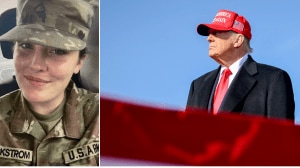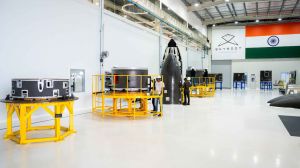America has a vested interest in India’s success
In building the open, civilised world that the 21st century demands, India and America will be close and vital partners.

In building the open, civilised world that the 21st century demands, India and America will be close and vital partners. While the last century was a time of global wars and often violent struggles for freedom, today’s era presents new tests. From terrorism and proliferation to energy and economic globalism, challenges and opportunities in our world today require confident and concerted action. And one of the most encouraging global developments is the growing partnership between the United States and India.
For many years our countries worked at cross purposes; though our interests converged in numerous areas and we shared the embrace of democratic values, to speak of India and America as partners was to speak of the future. No longer. Today we are building a partnership based on equality and mutual respect, in the knowledge that every global issue is far more likely to be managed successfully if our two countries are working together.
America has a vested interest in India’s success. In the first decades of the 21st century, the choices India makes for itself and for its place in the world will be of enormous importance, and not simply because it will be the most populous country on earth. India’s choices will radiate outward, directly affecting the future of its neighbours in East, Central, and Southwest Asia and rippling beyond as a major force in shaping the next phase of world history. The people of India will be making momentous choices, not just for themselves but also for billions of others.
I believe that America and India should stand shoulder to shoulder as this momentous process unfolds. That is one reason why I supported the historic civil nuclear deal. I supported it unequivocally, unlike my opponent in this election, who sought to attach “killer amendments” that would have scuttled the accord and greatly set back our partnership. India has been a responsible, law-abiding power, and it should be further integrated into the global effort to control proliferation of dangerous technologies, not marooned in some permanent “half-way” status. India should be able to take maximum advantage of new technologies that can provide energy without depending ruinously on imported, greenhouse gas-emitting fossil fuels. I am pleased that the American Congress prevented killer amendments from sinking this pact before it had a chance to move forward. Now that it is progressing, it should be a major step — but only one among many — in a robust program of strategic partnership between our nations.
We can work to enhance military cooperation, including promoting expanded Indian access to military technologies, partnership on missile defence, and cooperation to secure Indian Ocean sea lanes. Our countries share a vital interest in the defeat of terrorists who threaten open societies like ours, and it is in our interest to ensure that they find no safe haven. By increasing our counterterrorism cooperation, including through expanded intelligence sharing, we can work together to combat this danger. And by drawing on our natural strengths, we can partner to strengthen democracy and tolerance in other Asian states. We have begun to do so already, and should work to promote our values by adopting common approaches to toward countries like Burma.
The open world we seek demands greater US-Indian cooperation in areas like higher education, science and technology, clean energy, and agriculture. The United States should increase the number of visas it grants to skilled Indian workers seeking to come to America. Those workers help America, and they return skills to India. We develop global ventures that enrich both of our societies, as the Indian-American venture capital community demonstrates so strikingly.
A prosperous India, trading freely in the global marketplace, will boost American and global prosperity. Open trade benefits our economies, and so when voters complain about the “out-sourcing” of jobs to India, I believe we should address their concerns — but by helping them to adapt and compete, not retreat into isolationism and protectionism. The last sixty years have seen the greatest material improvement in human wellbeing in all of recorded history, a story that has trade at its core. That is why I believe that we must intensify our economic linkages.
The setback in the Doha round negotiations was unfortunate. I oppose wasteful, market-distorting farm subsidies to large agribusinesses, a policy that imposes costs on the American taxpayers and further burdens the world’s poor. India also worries about the effect of global competition on its small farmers. That’s an obstacle we can work together to overcome. The United States and India should address these issues as partners, whether it is through cooperation at the WTO or through a bilateral investment treaty. By preserving open economies at home and working to break down barriers globally, we can expand the benefits of international commerce to the entire world.
In the past, many Indian and American leaders have worked to expand our bilateral relationship, only to be stymied. No longer: India has proven to be a responsible nuclear power and an anchor of stability in an evolving Asia. The transformation of India-US relations in this new century will endure and intensify. International trends and events are pushing our two great democracies closer rather than apart, and our peoples have a vital stake in cooperation on behalf of our common prosperity and security.
I know that our partnership can help the 21st century become a great age, full of hope. Our predecessors fought in the last century to create a different kind of world, a world in which great nations share basic values and work on issues we all face as humans on a common planet. The opportunity to build that world has never been better. Standing together, India and the United States will do a great deal to shape it.



- 01
- 02
- 03
- 04
- 05




























